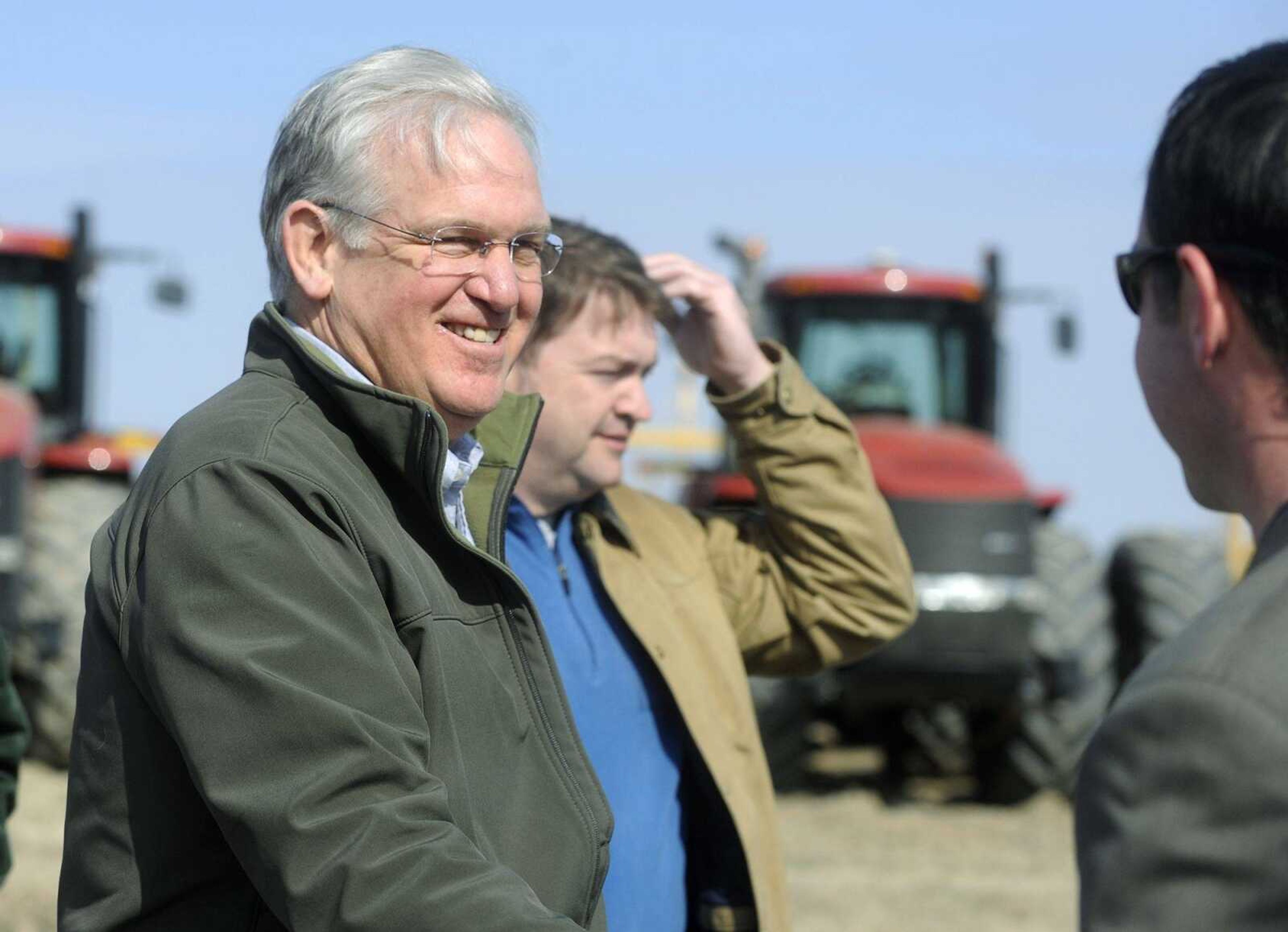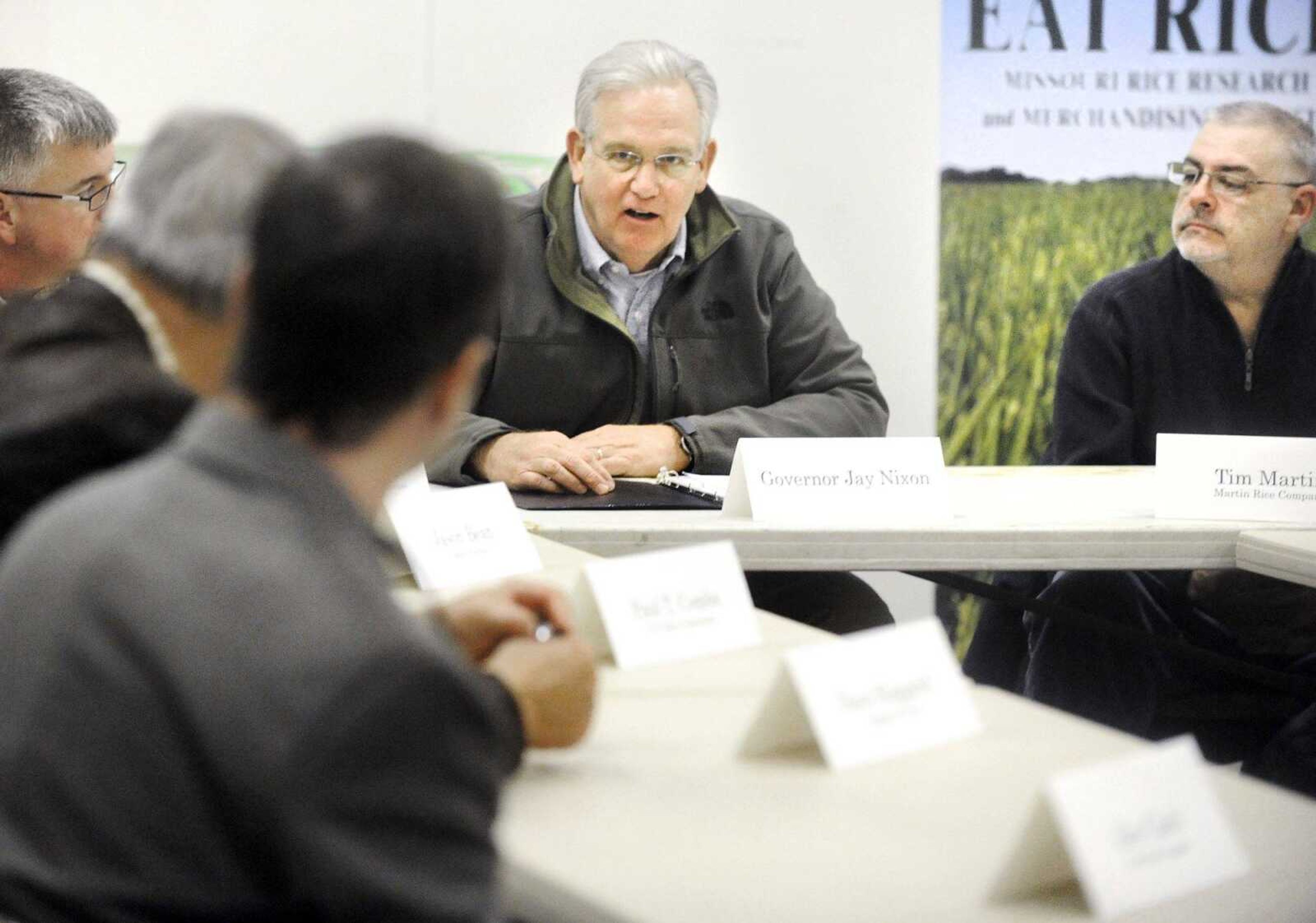Nixon to explore opportunities for agricultural trade with Cuba
Missouri's governor recently heard Bootheel rice and cotton growers' hopes for a mission that will cover the potential for expanded agricultural trade between Cuba and the United States. Since January, Gov. Jay Nixon has been preparing for an early March trip to Cuba, where he plans to meet with members of the Cuban agriculture cabinet, government secretaries and public and private interests who represent transportation and commerce...
Missouri's governor recently heard Bootheel rice and cotton growers' hopes for a mission that will cover the potential for expanded agricultural trade between Cuba and the United States.
Since January, Gov. Jay Nixon has been preparing for an early March trip to Cuba, where he plans to meet with members of the Cuban agriculture cabinet, government secretaries and public and private interests who represent transportation and commerce.
The governor also may tour Cuban ports for the purpose of "getting our eyes on the practicality of open trade there," he said.
At a roundtable discussion with farmers and agriculture industry representatives Feb. 13 in a rice storage warehouse in Stoddard County, Missouri, Nixon and the participants overall signaled optimism about the possibility of trade with Cuba but weren't without questions and doubts about the barriers.
Selling Missouri agricultural products to Cuba at a rate profitable for local farmers would require a vote of Congress to lift the trade embargo, which doesn't look likely in the near future, as the forming of diplomatic relations is still in an early stage.

But the conversation is beginning, and it comes at a time that could be no better for Southeast Missouri farmers.
"Right now, commodities are cheap. Too cheap," said Charles Parker, a Dunklin County, Missouri, cotton farmer and co-owner of Parker & Jones Farms. "The more we can move, the better."
Many growers are seeing a dip in profits as their cost of doing business keeps rising and commodity prices fall, triggered by multiple economic factors.
Increasing overseas exports to Cuba would benefit Missouri, especially in the agricultural sector, say Nixon and other supporters of the upcoming trade mission.
Missouri, according to estimates provided by Nixon, already is selling more than $10 billion in goods overseas annually, but it is selling to Cuba on a very limited basis, as goods must follow what the governor said is a "convoluted chain" using a "narrow, outdated process."
The state is the fourth-largest producer of rice in the country.
Greg Yielding of the Missouri Rice Council estimated Cuba as a 500,000-metric-ton market for rice and compared the trade that could be created with Cuba to the value of business between highly-populated Asian countries and the United States, because Cubans are estimated to consume as much as 115 pounds of rice per person per year.
"It might as well be China sitting over there, 90 miles from us," he said.
Before 1962, Cuba was the primary buyer of rice from the United States, according to the USA Rice Federation, but the relationship between the two countries dissolved.
Nixon said he believes one day, trade with Cuba will be the norm again, as it now is with previously closed-off nations like China and Vietnam.
Some Missouri farmers could export their product now, but they need a less costly way to do it, and through the trade mission, they need to learn the capabilities of Cuba's infrastructure to take in rice, said Alex Clark, a Poplar Bluff, Missouri, rice producer and member of the Missouri Rice Council.
"Knowing what their mills can handle, knowing how much we can push through once it does become an importer of our rice ... are their road conditions and ports well-equipped to handle (it)? Just understanding and getting a better idea of those things are important," Clark said.
Other farmers expressed concern about the way money changes hands in United States-Cuba trade, echoing comments made recently by some members of Congress, who oppose developing new relationships with Cuba -- diplomatic, economic or otherwise -- because of differences in the fundamentals of politics or because they worry other nations trading with Cuba may not have received all the money due for goods, and they don't want the United States to face the same challenge.
Some members of Congress, including U.S. Sen. Claire McCaskill, D-Missouri, support expanded trade. McCaskill just returned from a trip to Cuba, where she traveled in support of proposed legislation that would lift the embargo.
Nixon said the purpose of the trip is not to address the developing relations being handled by the U.S. State Department and other agencies, and he plans to focus strictly on trade.
"Really, we are trying not to touch the foreign policy issues," he said. "We are trying to stick to what we know."
Nixon said the value in the trip is Missouri getting to Cuba first -- he will be the first U.S. governor to travel there on such a mission -- and forming a good relationship in one area may affect the evolution of Cuba's political system later.
"Once free markets begin to flourish, we are very confident that democracy will follow," he said.
First lady Georganne Nixon also will travel to Cuba, where she will follow a separate schedule that focuses on promoting tourism.
Nixon's travel, along with that of other members of the U.S. Agriculture Coalition for Cuba, who are representatives of the agriculture industry, will be paid for by the Hawthorn Foundation, a not-for-profit economic development organization.
The Associated Press contributed to this report.
eragan@semissourian.com
388-3632
Connect with the Southeast Missourian Newsroom:
For corrections to this story or other insights for the editor, click here. To submit a letter to the editor, click here. To learn about the Southeast Missourian’s AI Policy, click here.









